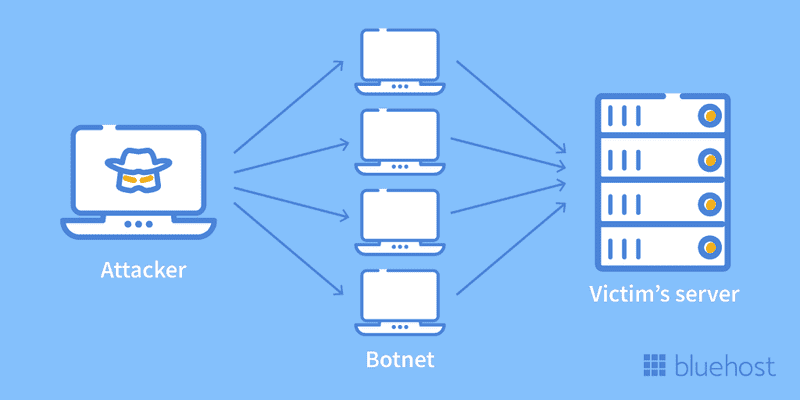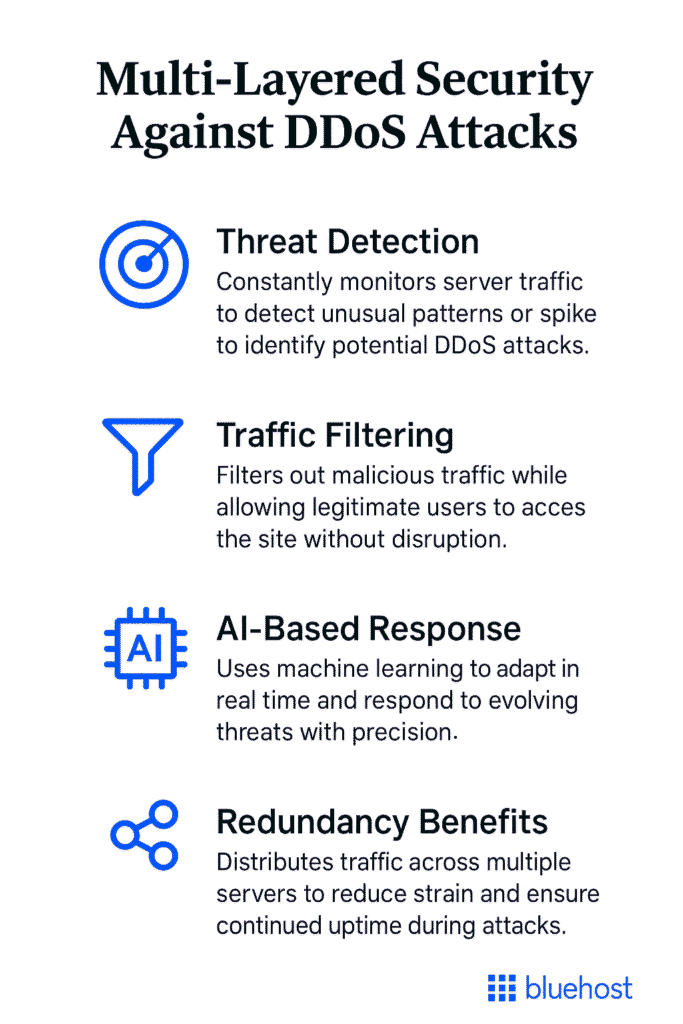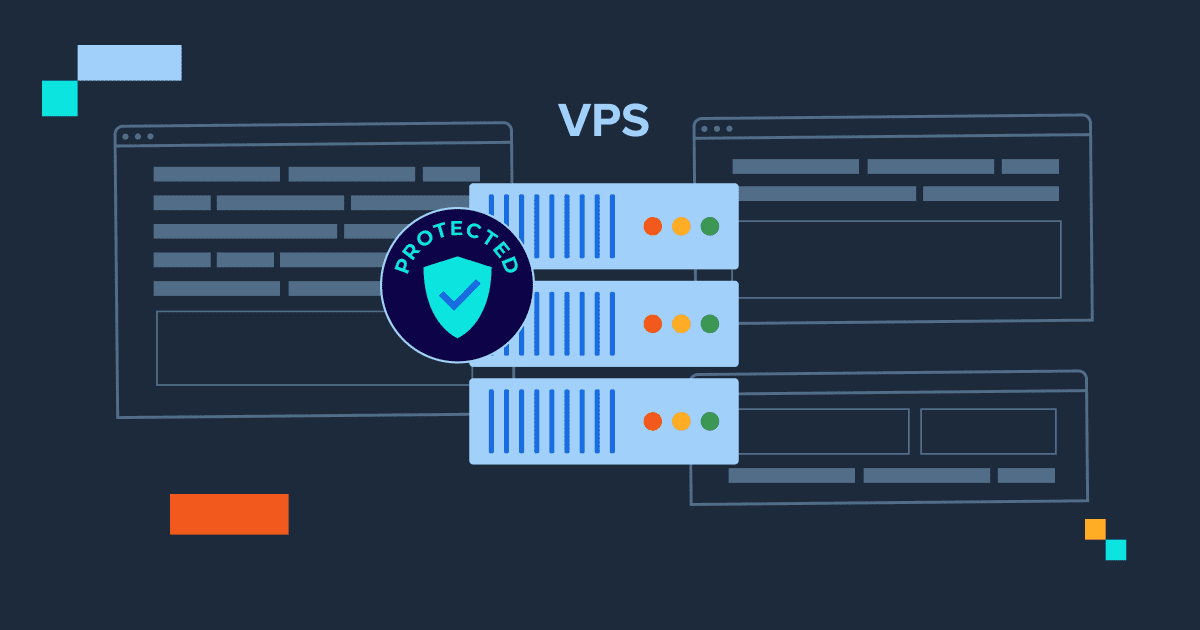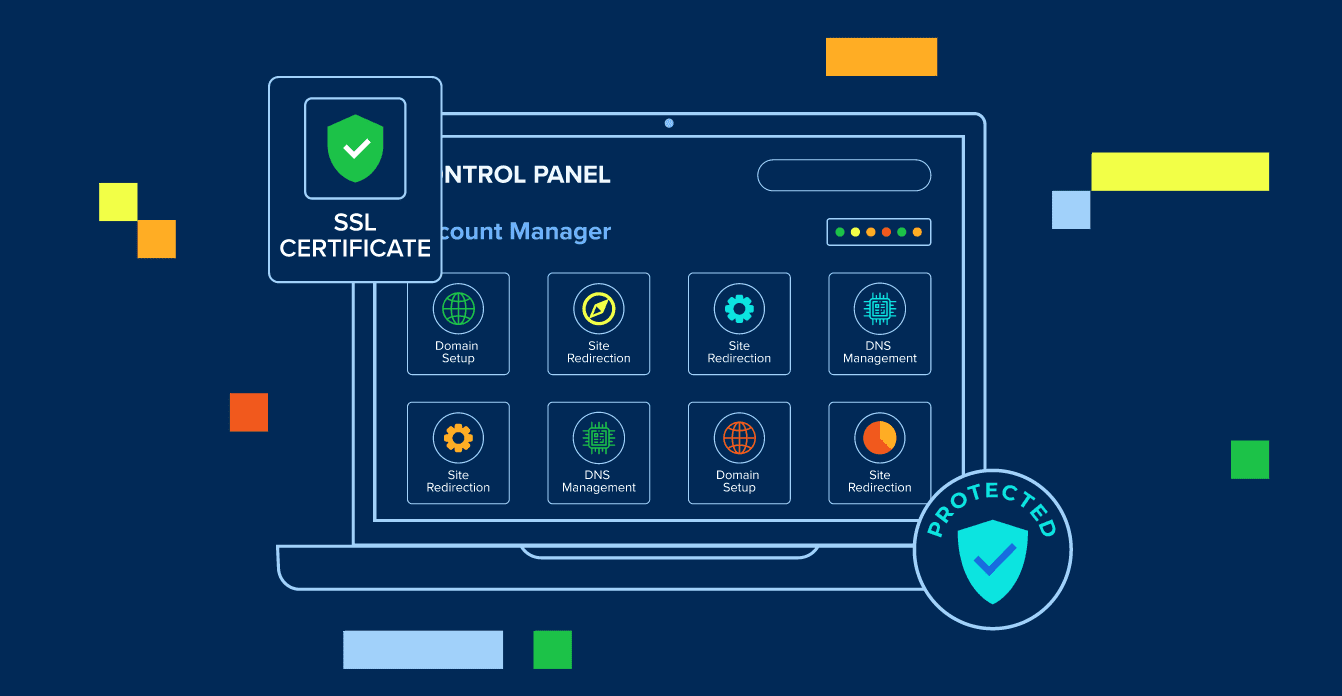Key highlights
- Understand why DDoS protected VPS hosting is crucial to keeping your website online.
- Learn how the essential features of DDoS protected VPS hosting solutions work to safeguard your site.
- Explore how advanced DDoS attack mitigation technologies actively defend your VPS against threats.
- Discover how security features like traffic filtering and AI-driven detection protect your site from malicious traffic.
- Identify which websites and businesses will benefit most from DDoS protection services.
Imagine your website goes offline at peak traffic, with no warning and no time to respond. This is exactly what happens during a DDoS attack. These disruptions aren’t random; they are targeted attempts to overwhelm your server with malicious traffic.
Without DDoS-protected VPS hosting, your website may lack the necessary defenses to withstand these attacks, leaving it vulnerable to downtime and data loss.
That’s where DDoS protection for VPS hosting comes in. At Bluehost, we provide advanced DDoS protection services with proactive threat mitigation, real-time monitoring and AI-driven filtering to keep your website secure and online, no matter the attack.
Let’s take a deeper look at why DDoS protection is essential for your VPS hosting.
Also read: Is My Website Protected Against DDoS Attacks?
What is a DDoS attack (and why should you care)?

A DDoS attack or distributed denial of service, is a cyberattack that floods your server with fake requests to crash your website.
Unlike traditional hacks, DDoS attacks don’t try to break in. Instead, they overwhelm your site with traffic from botnets, infected devices or spoofed IPs.
This results in slow performance, broken pages or complete site outages. Without DDoS attack mitigation, even a small attack can take your VPS offline, causing significant disruption.
If you’re running a business, blog or app on VPS hosting without built-in DDoS protection, you’re at risk of losing traffic, revenue and customer trust.
In 2025, global cybercrime damages are estimated at $10.5 trillion annually, with costs continuing to rise. This shows how essential DDoS protection is for safeguarding your online presence.
In the next section, we’ll dive into what DDoS protected VPS hosting is.
Also read: Secure VPS Hosting with Advanced DDoS Protection
What is DDoS protected VPS hosting?
DDoS protected VPS hosting is a virtual private server with integrated safeguards that prevent malicious traffic from impacting your site.
It ensures consistent performance, uptime and security during high-volume attacks by filtering harmful traffic before it reaches your server.
Unlike shared hosting, where one attack can affect multiple websites, a VPS offers dedicated resources, ensuring isolation and enhanced security.
You now understand what DDoS-protected VPS hosting is. Next, let’s uncover how anti-DDoS server architecture works behind the scenes to secure your site.
How does an anti-DDoS server provide enhanced protection?

A standard server may detect suspicious traffic. An anti-DDoS server, however, is specifically designed to block and fight such attacks. These systems use multiple defense layers, including smart threat detection, automated response, scrubbing and redundancy.
This creates a hosting environment that quickly withstands, absorbs and recovers from DDoS attacks without affecting your legitimate users.
Let’s break down how each component works.
1. Threat detection
An anti-DDoS server uses behavioral analysis, real-time monitoring and IP reputation databases to detect threats as they emerge. It detects red flags such as SYN floods, DNS amplification and unusual request spikes from certain regions.
Early detection stops DDoS threats before they escalate using signature matching and real-time anomaly detection.
Also read: WordPress Security – Best Practices & Protection Tips
2. Traffic filtering
Once an attack is detected, the system instantly reroutes traffic through scrubbing centers. These centers strip out malicious packets while allowing clean traffic to reach your VPS. Filtering happens at the network and application layers, which means attackers are blocked even if they change tactics mid-attack.
Malicious requests are blocked at the network level while clean; incoming traffic continues uninterrupted. This helps maintain consistent site availability and performance.
3. AI-based response
AI-based protection systems can analyze millions of data points in seconds. They dynamically adjust firewall rules, rate limits and filtering thresholds based on the attack’s behavior.
This lets your server instantly respond to zero-day or multi-vector attacks, mitigating threats faster than manual rules.
4. Redundancy benefits
Anti-DDoS infrastructure is built for resilience. It includes multiple geographically distributed data centers, load balancers and automatic failover systems. If one location is overwhelmed, traffic is seamlessly rerouted to a backup system, keeping your website alive and performing well during attacks. This redundancy ensures your VPS maintains optimal performance even during high-volume attacks.
Understanding how an anti-DDoS server works is only part of the equation. Next, learn the key features to choose a VPS hosting with DDoS protection that effectively mitigates attacks and secures your infrastructure.
Key features to look for in DDoS Protected VPS hosting?
Choosing the right VPS protection services isn’t just about ticking boxes. It means choosing a solution that detects, filters and blocks threats while keeping your site fast and accessible.
The right setup combines smart technology with responsive infrastructure to protect your business from all types of DDoS attacks. Here are the features that matter most:
1. Network-level filtering and upstream protection
Effective DDoS defense starts before harmful traffic even hits your server. Look for services that offer upstream mitigation through ISP-level or content delivery network (CDN)-level traffic filtering.
This helps neutralize high-volume attacks at the network edge, minimizing latency and preserving server resources through ISP or CDN level filtering. This blocks large attacks at the network edge, reducing latency and saving server resources. This means attack traffic is dropped before it even reaches your server.
2. Scrubbing centers and firewall integration
Scrubbing centers act as cleaning stations that remove malicious traffic in real time. During a DDoS attack, traffic is routed through global centers before reaching your site.
Combined with a strong Web Application Firewall (WAF), this setup blocks volumetric and complex application-layer attacks while clearing malicious traffic during large events. Paired with a robust WAF, your site is protected from both volumetric and application-layer attacks.
3. Real-time analytics and threat visibility
Effective defense starts with clear insight. Real-time dashboards track traffic, spot unusual spikes and detect unauthorized access attempts. Choose services providing detailed data on blocked IPs, requests, anomalies and post-attack logs.
Real-time analytics provide insights on source IPs, request types and blocked threats, helping you respond and plan better.
Before you choose a VPS hosting plan, it’s helpful to see how a basic VPS stacks up against one designed with anti-DDoS protection. Here’s a breakdown of key differences between basic VPS and DDoS protected dedicated servers to help you choose the best security and performance.
Comparison between a standard VPS and a DDoS protected VPS server
If you’re unsure whether to choose standard VPS hosting or invest in a DDoS protected VPS, this side-by-side comparison will help you make an informed decision.
Here’s how the two options stack up:
| Feature | Basic VPS hosting | DDoS protected VPS hosting |
| DDoS protection | No | Yes |
| Traffic filtering | Basic | AI-driven + layered |
| Scrubbing center access | No | Yes |
| Cloudflare CDN integration | Optional | Included |
| Redundancy and failover | Limited | Built-in |
| Real-time monitoring | Minimal | 24/7 proactive |
Now that you understand how a DDoS protected VPS hosting plan outperforms a basic setup, let’s dive into how our VPS plans use KVM virtualization to create isolated, secure server environments, along with SSD storage for optimized performance.
How does Bluehost keep your VPS secure and online?
We at Bluehost know how critical it is to keep your VPS secure and online. That’s why we’ve built multiple layers of protection into our VPS hosting plans to defend against DDoS attacks and other threats.
Here’s how we help protect your VPS:
1. Integrated Cloudflare CDN with DDoS protection
Every Bluehost VPS hosting plan includes built-in Cloudflare CDN integration. This acts as a global shield, blocking malicious traffic and DDoS attacks before they reach your server. By filtering attacks early, Cloudflare preserves server resources and keeps your site fast and reliable.
2. Secure, always-on VPS environments
Our VPS environments are hardened and isolated with advanced security controls. We maintain always-on infrastructure with continuous monitoring and proactive defenses to detect and mitigate threats before they impact your site. This commitment to uptime ensures your VPS stays available to your visitors 24/7.
Need enterprise-grade protection? Start with Bluehost’s advanced VPS Hosting with DDoS protection. Start now and enjoy 24/7 expert support.
3. 24/7 expert support for attack mitigation
Our dedicated support team is available 24/7 to assist you in case of unusual traffic or attack escalation. With vast experience in VPS protection services, we respond quickly to mitigate attacks, minimize downtime and keep your site running smoothly.
4. Optional additional security services
We offer optional protection layers like SiteLock for malware scanning and removal. We also provide CodeGuard for automated backups and recovery, plus Pro Services for personalized security management. These tools enhance your VPS security beyond the basics.
Also read: Protecting Your Website From CyberThreats With SiteLock Security
5. Flexible upgrades to match your needs
As your business grows, you can easily upgrade your VPS hosting plan to add more resources and advanced protection features. This scalability ensures your site remains secure and performant, no matter how much traffic you handle.
With these comprehensive features and expert support, we at Bluehost provide you with a VPS hosting experience that’s not only powerful but also built with security at its core. You can focus on growing your business while we keep your website protected against attacks.
Beyond the protection included with our VPS plans, there are additional steps you can take on your end to strengthen security even further.
9 best practices to further protect your VPS from DDoS attacks
These practices combine fundamental security hygiene with advanced server-hardening techniques.
1. Regular updates and patches
Keep your server OS, applications and plugins updated. Timely patches close vulnerabilities that attackers often exploit to launch disruptive attacks.
2. Configure firewalls and antivirus
Use your VPS firewall (iptables or nftables) to define strict inbound and outbound rules. Pair it with a WAF to block malicious HTTP requests and defend against application-layer threats.
3. Apply rate limiting measures
Enforce connection limits and request thresholds to prevent resource exhaustion. Bandwidth throttling and connection caps help maintain server availability during traffic surges.
4. Restrict access to unused ports
Harden your VPS by closing all unnecessary ports. For critical services, enable access controls such as SSH key authentication and limit connections to trusted IP ranges.
5. Use a content delivery network (CDN)
A CDN distributes network traffic across multiple edge nodes. It helps absorb volumetric attacks and reduces latency, keeping your VPS from being the single point of failure.
6. Deploy an intrusion detection and prevention system (IDPS)
An IDPS scans for unusual traffic patterns using techniques like deep packet inspection and anomaly detection. It can automatically drop malicious packets and block suspicious sources in real time.
7. Automate site backup
Schedule encrypted, automated backups of both data and configurations. Store them offsite to ensure fast recovery if your VPS is compromised or needs to be restored after an outage.
8. Monitor and analyze server logs
Review system logs, firewall logs and web access logs regularly. Look for repeated failed login attempts, protocol misuse or abnormal spikes in requests to identify threats early.
9. Develop an incident response plan
Prepare a documented plan for attack scenarios. Include steps for isolating compromised services, escalating to your hosting provider and restoring clean backups to reduce downtime.
With a clear understanding of how to safeguard your VPS from attacks, let’s take a look at who stands to gain the most from DDoS protected hosting.
Also read: VPS Security Tips and Best Practices to Secure your Server
Use cases: Who needs VPS hosting with DDoS protection?
DDoS attacks don’t discriminate if they can target any website or online service. Some sites are especially vulnerable because of high traffic, critical operations or valuable data. For these sites, DDoS protected hosting is essential to maintain uptime, protect revenue and safeguard user trust.
Here are key use cases where DDoS protection becomes an integral part of your hosting strategy:
1. eCommerce sites during high-traffic events
Online stores often experience traffic spikes during sales, holidays or product launches. These peak periods are prime targets for DDoS attacks aimed at disrupting sales. Having DDoS protection ensures your store remains accessible when customers need it most.
2. Agencies managing client websites
Web agencies and digital service providers often host multiple client sites. A DDoS attack on any one site can impact overall performance and reputation. DDoS protected hosting helps agencies deliver reliable service and peace of mind to their clients.
3. Forums, apps and SaaS platforms
Interactive sites with user-generated content or active users often face frequent attack attempts. VPS hosting with DDoS protection guarantees consistent availability, preventing user frustration and potential data loss.
4. Financial and public-sector websites
Banks, government portals and public service platforms often hold sensitive data and provide critical services. Downtime can have serious consequences for users and their reputation. Robust DDoS protection is vital to prevent service interruptions and maintain trust.
In these cases, DDoS protected VPS hosting prevents downtime, ensures performance and lets you focus on growing your business.
Now that we’ve seen who benefits most from DDoS protected hosting, let’s dive into how to choose the right VPS plan to fit your needs.
How to choose the best DDoS protected VPS hosting for your needs?
Choosing the right DDoS protected VPS hosting plan involves considering several important factors that impact your website’s security and performance:
1. Traffic volume and patterns
Understand your website’s typical and peak traffic. Sites with high or spiking traffic need VPS with DDoS protection to handle large attacks without slowing or crashing.
2. Type of business and sensitivity of data
If your website handles sensitive customer data like payment information or personal details, extra protection is crucial. Choose a plan with enhanced security features and compliance support to safeguard this information effectively.
3. Range of protection features
Choose VPS plans with defenses like AI traffic filtering, global scrubbing centers, firewalls and CDN integration. These layered protections help stop attacks at different stages before they reach your server.
4. Scalability and upgrade options
Your hosting needs can grow over time. Select a VPS plan that lets you easily upgrade protection and resources to keep your site secure as traffic grows.
5. Support availability and proactive monitoring
Fast, knowledgeable 24/7 support is essential during an attack. Proactive monitoring detects threats early, enabling quick response to reduce downtime and damage.
6. Cost-effectiveness and value
Staying on budget matters but investing in reliable DDoS protected VPS hosting is essential. It helps prevent costly downtime, lost revenue and damage to your reputation.
At Bluehost, we offer VPS hosting plans tailored with these factors in mind. Our solutions combine powerful anti-DDoS technology, expert support and flexible options to ensure your website stays protected and performs optimally.
Now that you know how to choose the best DDoS protected VPS hosting for your site, it’s worth looking at the practical advantages it provides.
5 benefits of DDoS protected VPS hosting
Here are five ways DDoS protection can make a difference for your site. Beyond blocking attacks, it also improves day-to-day performance and reliability.
1. Maintains your SEO rankings during traffic surges
Search engines penalize websites that go offline or load slowly. DDoS protection keeps your site stable during heavy traffic, preventing downtime that could harm your SEO performance.
2. Preserves customer trust with consistent availability
Every minute of downtime can erode user confidence. With DDoS protection, your visitors experience uninterrupted access, reinforcing trust and improving customer loyalty.
3. Reduces strain on internal IT resources
Handling a DDoS attack without built-in protection requires constant manual monitoring and response. With automated defenses, your IT team can focus on innovation instead of firefighting.
4. Supports compliance with uptime SLAs
Many businesses are bound by service-level agreements that require a high percentage of uptime. DDoS protected hosting ensures compliance, helping you avoid penalties and protect business credibility.
5. Provides peace of mind for high visibility launches
Product releases, campaigns or events can make your site a target for bad actors. DDoS protection ensures your VPS stays resilient, letting you focus on growth instead of disruption.
Final thoughts
DDoS attacks are becoming more common and complex, making mitigating DDoS attacks essential for any website. Without it, your VPS could face downtime, lost visitors and damage to your reputation.
At Bluehost, we offer strong, multi-layered DDoS protection built into our VPS hosting plans. With Cloudflare CDN, real-time monitoring, SiteLock, free SSL certificate and domain privacy, we keep your site secure and running smoothly.
Whether you run an online store, client sites or critical services, the right VPS with DDoS protection keeps your site online and users safe.
Explore DDoS protected Bluehost VPS hosting plans and keep your site fast, secure and always available.
FAQs
A DDoS attack is a type of denial-of-service DDoS attack that overwhelms your site with fake traffic. This causes slow load times, frequent outages and blocks real users from accessing your site.
Yes. Without proper DDoS protection, even a small attack can take your VPS offline, impact your online services and damage your business reputation. Attack mitigation hosting is essential to ensure your website remains operational during a DDoS attack and to safeguard against significant downtime.
Anti-DDoS servers protect your infrastructure from network-level attacks like SYN floods and traffic spikes. WAFs protect your applications from threats like SQL injections. For full security, you should use both of them.
Yes, our DDoS protected VPS hosting includes Cloudflare CDN, real-time filtering and layered mitigation tools designed to handle major attack events.
Start by evaluating your website’s traffic, the sensitivity of your data and the risk level of your industry. Our team at Bluehost can help you select the right plan based on your infrastructure and goals.
Not exactly. DDoS protection web hosting usually refers to shared hosting with added defenses, but resources are limited. With DDoS protected VPS hosting, you get isolated environments, dedicated resources and advanced mitigation, making it the stronger option for security and uptime.



Write A Comment